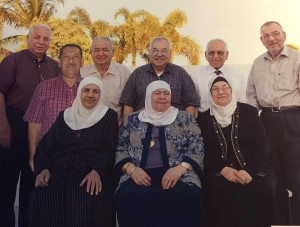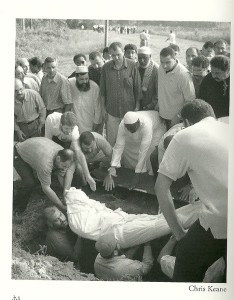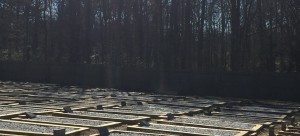BY ROSE HAMID
Guest column
My uncle, Nitham Hasan, passed away recently. He was 88, the eldest of my father’s seven siblings and the first to pass away. As a leader of the Islamic center of South Florida for 30 years he was well loved and respected. He spent his life educating people about Islam and building bridges of understanding with people of all faiths. It was said of him, “He leaves a void that is hard to fill and a legacy that is hard to match.”
 My father (3rd from the left) and his siblings. My Uncle Nitham is second from the right.
My father (3rd from the left) and his siblings. My Uncle Nitham is second from the right.
I was glad I was able to see him before he died and attend his funeral. Funerals are strange things. On the one hand is the grief for the loss of a loved one, on the other is the love, comfort and yes, joy of seeing family and friends. Overshadowing all of that are the logistics of the funeral arrangements.
Islamic funerals are very modest and have some simple requirements. Muslims should be buried as soon as possible after death and should be buried in the town they died in. The body shouldn’t be shipped “back home,” which is why Muslims don’t buy burial plots in advance.
To prepare for burial a ritual cleansing of the body is performed, preferably by family and/or friends of the deceased or, if none are able, by volunteers from the local mosque. The body is to be treated with dignity and respect. I’ve had the honor of washing the bodies of some close friends. It was a spiritual process done with love and dignity, and it provided a great connection and sense of closure.
Once the body is cleaned, it is wrapped in a shroud of plain white fabric, which is a reminder that everyone is equal in the eyes of God, no fancy clothes or uniforms, etc.
One aspect that was hard for me to come to terms with at first is that the body gets placed directly into the ground without a coffin. I’ve come to realize it’s a lot more natural/organic to bury directly in the earth. If city ordinances (or circumstances) require the use of a coffin, a simple pine box could be used.
 Muslim being buried in the Islamic cemetery in Gastonia, 2006 Photo taken by Chris Keane for Families of Abraham exhibit.
Muslim being buried in the Islamic cemetery in Gastonia, 2006 Photo taken by Chris Keane for Families of Abraham exhibit.
The Janazah (funeral) prayer is conducted at a mosque or a space adjacent to the burial grounds. It’s a simple process with the deceased in front of the congregation. Before my uncle’s funeral prayer the Imam said a few words about him. The prayer itself is very short and includes prayers for the deceased as well as the family. Once the prayer is finished the body is transported to the grave site.
The grave site can have a small placard denoting who is buried there, but there should be no elaborate headstones. The point is not to be ostentatious.
 The Islamic Cemetery in Charlotte, NC
The Islamic Cemetery in Charlotte, NC
Muslims believe that the deceased can hear what is happening around them until the last person walks away from the grave; therefore, there should not be any loud wailing or crying. Muslims view death, and its timing, as a decree from God, and we try to accept it with a sense of peace and patience. “Indeed we belong to God, and indeed to Him we will return.” Quran 2:156
It is said that once a person dies there are three things that will benefit them in the hereafter: to have raised a righteous child, to have taught others and to have established a continuous charity (like a mosque or school that continues to benefit others). My uncle has succeeded in all three of those things, and I pray he will be raised to the highest level of heaven. Rest in Peace Uncle Nitham
To see how the column appeared in the Charlotte Observer, click here
